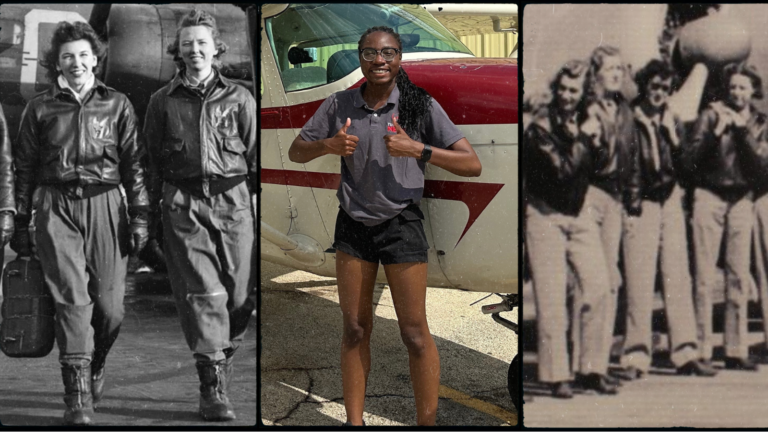The Department of Aerospace Engineering at the University of Illinois is hosting a screening of the 1999 documentary “Fly Girls”12. This film tells the story of the Women Airforce Service Pilots (WASP), a group of over a thousand women who made significant contributions during World War II. These women who were the first to fly U.S. military aircraft, performed a range of duties that included testing and ferrying aircraft, as well as training other pilots.
Following the screening, there will be a panel discussion featuring women currently making strides in the aviation and aerospace industry. One of the panelists is Chy’Amari Finley, a young Black woman majoring in Aerospace Engineering at the University of Illinois. Finley spoke with IPM Newsroom’s Kennedy Vincent to share her thoughts on the documentary and discuss her own experiences in aviation.
Kennedy Vincent: Chy-Amari, you have been involved in aviation and aerospace since high school. What first inspired you to learn more about aviation?
Chy-Amari Finley: It started definitely when I was in like elementary school looking up at planes and like, how does it play not fall out of the sky, it turned into like various spacecraft through like movies. And then I saw a future where I could potentially work in that. Ever since I’ve been keeping with it.
KV: You’ve also been working on outreach primarily with students from underrepresented communities. Tell me more about that.
CF: When I first started being in depth in aerospace, I started building rockets at an airport hangar. And this airport hangar also had various youth programs associated with flying. From there, I was offered the opportunity to start flying planes myself. And since I am a very young pilot, I kind of helped those following me.
KV: As a young black woman, and aspiring space engineer, what is the importance and role of women and women of color in aviation?
CF: Think diverse people have very diverse ideas. So, I definitely, definitely want to be a source for people to see that people like them can’t succeed in the spaces that they want to be in.
KV: What are some of the barriers you face as a black woman in aviation?
CF: A lot of times people underestimate, underestimate me. And think I can’t succeed, I guess as much as them or perform at a certain standard. So I definitely try to break that barrier down.
KV: How else do you think that you can overcome some of those barriers?
CF: Outreach for me was pretty big. Because just putting myself out there makes others feel like they can also put themselves out there. So definitely, just making myself be known, helps in my experience, as well as others.
KV: What can people expect when attending the fly girls film and listening to the panel you will be featured on?
CF: They can expect to hear about how women in World War Two definitely broke down a lot of barriers. how the industry has changed how the industry has stayed the same over the years.
KV: You have a private pilot license at 19 years old. You’ve worked with the Tuskegee Airmen, and you’re also researching how the human body is affected in space. What’s next in your career, and after you earn your degree?
CF: Definitely want to go to grad school, get some sort of PhD and what I see myself doing which falls in the realm of space medicine, so working with people in space or astronauts and seeing how the body is affected during prolonged space missions.

